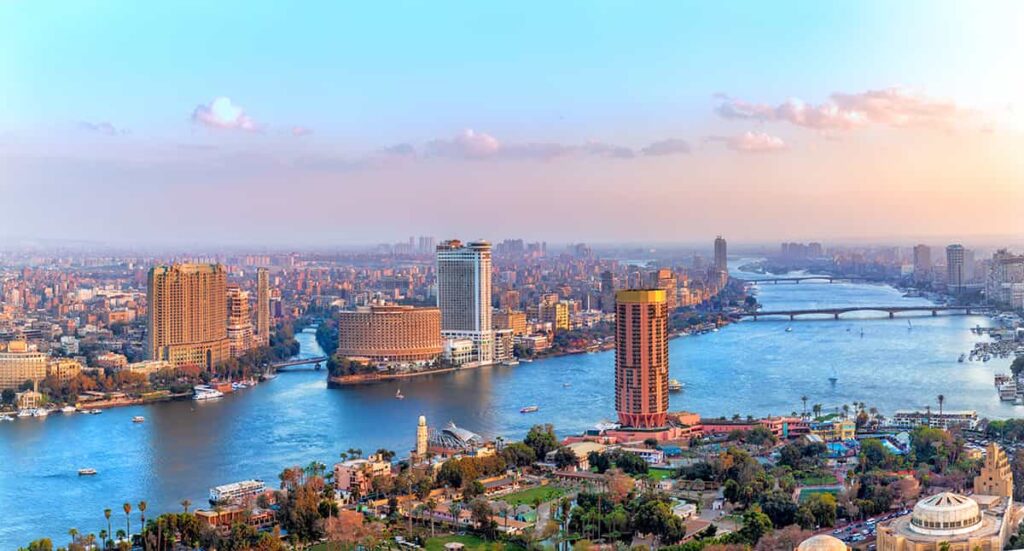As the new trade deal gets underway, two new reports highlight Egypt’s leadership role.
Two recent expert reports highlight Egypt’s unique potential to benefit from a more fully implemented African Continental Free Trade Area (AfCFTA) agreement. They help fuel much-needed optimism about the future of an economy battered by short-term geopolitical and other problems that have led to symptoms such as 38% inflation last September.
“Egypt has what it takes to play a key role,” said Landry Signe, a senior fellow at the Brookings Institution, a think tank in Washington, D.C., and a professor at the Thunderbird School of Management, a business school in the United States. “For SMEs (small and medium-sized enterprises) and large companies, opportunities are everywhere.”
The analysis was supported by last year’s $7 billion World Bank deal (to support private sector jobs, health and education, and climate change adaptation) and a new International Monetary Fund (IMF) lending program announced this month, at $5 billion, which in turn followed a $35 billion agreement with the Emirates sovereign wealth fund ADQ. After the deal with the IMF, the World Bank decided to contribute another $3 billion.
The AfCFTA-Egypt reports come from the Organization for Economic Cooperation and Development (OECD), the Paris Club of Rich Countries, and the Trade Law Center (tralac) in the Western Cape, South Africa. Both suggest that Egypt is well positioned to benefit from and help advance the AfCFTA.

AfCFTA became the world’s largest regional free trade agreement when it was officially launched in 2021. The World Bank predicted it could increase regional trade by 7%, or $450 billion, and lift 30 million people out of extreme poverty by 2035. Gaining momentum in trade volumes, partly due to Covid restrictions, the agreement has made progress on the administrative, legislative and diplomatic fronts.
The Egyptian government has signed up in 2022 as one of eight countries that will conduct accelerated testing under the so-called Guided Trade Initiative (GTI). (The others were Cameroon, Ghana, Kenya, Mauritius, Rwanda, Tanzania and Tunisia.) Recent reports suggest that at least 24 more countries are planning to join the GTI soon, although insiders unofficially suggest the number could exceed 30.
The third Intra-African Trade Fair was held in Cairo in November, organized by the African Export-Import Bank (Afreximbank) in collaboration with the African Union and the AfCFTA Secretariat. “The potential exists and the opportunities exist, but some obstacles and problems may arise,” Egyptian President Abdel Fattah el-Sisi said at the inauguration ceremony. “We in Egypt must always build, develop, rebuild and cooperate in these areas, and nothing less.”
The private sector appears to take politicians at their word. “Egypt is really trying to achieve this,” says Osama Elsayed, chief operating officer of BPC Banking Technologies, an Egyptian financial software firm. “The government’s official position is to do everything possible to ensure implementation goes smoothly.”
Intra-regional trade in Africa remains at 15%, much lower than Europe (61%) and Asia (59%), according to an OECD report entitled “Egypt’s Manufacturing Transformation Policy Review: Focus on AfCFTA and Industrialization” published In November. .
The apparent lack of progress can be explained by several factors that go beyond limitations, according to a section of the Foresight Africa 2024 report prepared by the Africa Growth Initiative, a program of the Brookings Institution, published in January and authored by Andrew Mold, director of the Regional Integration Office for Eastern Africa at the Economic UN Commission for Africa, as well as Francis Mangeni of the AfCFTA Secretariat and Senior Research Fellow at the Nelson Mandela School of Government, University of Cape Town. These could be: that it is normal, for example, that the European Union took years to consolidate; The AfCFTA tariff reduction should be gradual and last until 2035; and because non-tariff barriers also need to be eliminated.
Add to this simple logistical problems. “The whole problem with Egypt and sub-Saharan Africa is the Sahara Desert,” says John Stewart, economist and policy analyst at tralac and author of the aforementioned report.

Egypt, along with Nigeria and South Africa, is among the most advanced industrial centers in Africa. It is also a major trading hub, although until now it has been focused mainly on Europe, the Middle East, North Africa (MENA) region and even Asia. The strength of this triumvirate can translate into new opportunities. “The three largest economies on the continent—Nigeria, South Africa, and Egypt—have large trade surpluses with their continental partners, so in principle they can afford to adopt liberal import regimes for intra-African imports,” according to Brookings.
The OECD and Tralak reports, as well as several others, have identified several sectors that are priorities for both the trade group and Egypt’s industrial policy. These include: renewable energy sources; pharmaceuticals; logistics and transport; apparel, textiles and apparel (CLT); agribusiness and processed foods.
According to another report published last year by the World Economic Forum, led by Signe, there is anecdotal evidence of progress in some areas. The report, entitled “AfCFTA: A New Era of Global Business and Investment in Africa”, notes that “several global automotive companies… have expanded their operations” on the continent, working with the governments of Egypt, Ghana and South Africa, among others, as well as AfCFTA Secretariat. He named Egypt, along with Rwanda and South Africa, as a leader among e-mobility startups that are developing environmentally friendly vehicles.
Egypt already plays an important role in several global value chains, including the CLT, oil and gas, automotive and renewable energy chains, among others, as described in tralac’s trade brief, “Potential Developments for Egypt’s Trade under the AfCFTA.”
Egypt has been a leading cotton producer for thousands of years, but “clothing is not their forte,” Stewart said. Perhaps they can use the AfCFTA to connect with cheaper clothing manufacturers on the continent. “They might be happy to import textiles,” he adds.
By extending its supply chain expertise to other parts of Africa, Egypt can help itself while helping others on the continent. “AfCFTA offers Egypt a unique opportunity to increase its participation in the African value chain,” the Tralak document concluded.


